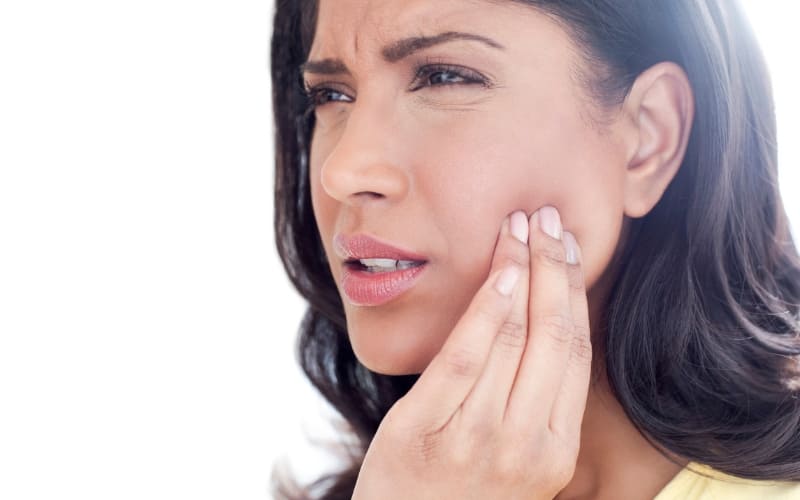Call: (810) 674-3060
What Are the Main Causes Of TMJ?

Introduction
Millions of individuals worldwide suffer from temporomandibular joint dysfunction or TMJ. The temporomandibular joint connects your jaw to your skull, allowing you to perform crucial activities like talking, chewing, and swallowing. When this intricate system encounters problems, it can result in pain, discomfort, and a reduced quality of life.
This comprehensive article will delve into the main causes of TMJ, explore its complexities, and discuss prevention and treatment options for those affected.
Understanding TMJ
To understand the causes of TMJ, it’s essential to comprehend the anatomy of the temporomandibular joint. This joint acts like a sliding hinge, connecting the mandible (lower jaw) to the skull’s temporal bone.
It allows for a wide range of motions required for daily activities, from speaking and eating to facial expressions. Temporomandibular Joint disorder occurs when there is a malfunction in this joint, leading to various symptoms ranging from mild discomfort to severe pain.
Common symptoms of TMJ disorder include:
– Jaw pain or tenderness
– Popping or clicking noises made when the mouth is opened or closed
– Jaw locking, which makes it challenging to open or close
– Headaches
– Earaches
– Difficulty chewing
– Facial pain
– A tired feeling in the face
– Swelling on the cheek side
Now that we have a basic understanding of TMJ, let’s explore the primary causes of this condition.
The Main Causes of TMJ
Various factors can cause TMJ; sometimes, a combination of these factors contributes to the disorder. Here are the main causes:
A. Genetic Factors
Genetics can play a significant role in the development of Temporomandibular Joint. If your family has a history of TMJ disorders, you may be more susceptible to it. Some individuals may inherit traits like jaw shape, size, and structure that increase their risk of developing TMJ.
B. Dental Issues
Dental problems can be a major contributing factor to TMJ. Irregularities in your bite, misaligned teeth, or improper dental work, such as poorly fitted braces or dentures, can strain the temporomandibular joint excessively. This additional stress can lead to the development of TMJ symptoms over time.
C. Trauma and Injury
Physical trauma or injury to the face or jaw can be a cause. Accidents, such as car crashes, sports injuries, or a blow to the face, can damage the temporomandibular joint or the surrounding muscles and ligaments. Even seemingly minor traumas can lead to TMJ symptoms if left untreated.
D. Stress and Emotional Factors
Stress is a common trigger for TMJ symptoms. You may clench your jaw or grind your teeth when stressed or anxious, especially during sleep. This continuous pressure on the jaw joint can lead to TMJ symptoms. Emotional factors like anxiety and depression can exacerbate the condition, making it more challenging to manage.
E. Arthritis
Arthritis, an inflammatory condition that affects the joints, can also lead to TMJ. Osteoarthritis and rheumatoid arthritis can damage the cartilage in the temporomandibular joint, causing pain and dysfunction.
F. Other Potential Causes
In addition to the primary causes mentioned above, there are other potential contributors to TMJ, including hormonal fluctuations, certain autoimmune diseases, and even excessive gum chewing. In some cases, the exact cause of TMJ remains unknown, making it a complex and multifactorial condition.
Prevention and Possible Treatments
Preventing TMJ is not always possible, especially if the disorder has a genetic component. However, there are steps you can take to reduce your risk and manage the condition if you’re already affected:
1. Maintain good posture:
Proper posture can reduce strain on your jaw joint. Avoid slouching and keep your head and neck in alignment.
2. Be mindful of stress:
Practice stress management techniques like relaxation, deep breathing, and meditation to reduce jaw clenching and grinding.
3. Avoid excessive gum chewing:
Chewing gum excessively can overwork the jaw muscles, potentially leading to TMJ issues.
4. Limit hard and chewy foods:
Avoid excessively hard or chewy foods that can strain your jaw joint. Opt for a diet that is gentler on your jaw.
5. Stay hydrated:
Dehydration can cause muscle tension, so drink enough water to relax your muscles.
If you already have TMJ, various treatment options are available, depending on the severity of your condition. These treatments can include:
6. Lifestyle modifications:
Implementing the preventive measures mentioned above can alleviate mild TMJ symptoms.
7. Medications:
Over-the-counter pain relievers, muscle relaxants, or anti-inflammatory drugs may be prescribed to manage pain and inflammation.
8. Physical therapy:
A physical therapist can help you perform exercises and stretches to improve jaw mobility and alleviate pain.
9. Dental treatments:
If dental issues contribute to your TMJ, your dentist may recommend orthodontic treatment, dental splints, or other dental procedures to correct the problem.
10. Injections:
In some cases, injections of Botox or corticosteroids may be used to relieve muscle tension and pain.
11. Surgery:
In severe cases where other treatments are ineffective, surgery may be considered to repair or replace the temporomandibular joint.
Final Words!
TMJ is a complex condition with various potential causes, making it challenging to prevent and treat. While some factors, such as genetics, cannot be controlled, adopting a healthy lifestyle, managing stress, and seeking early treatment for dental issues can significantly reduce the risk of developing TMJ or alleviate its symptoms.
If you are experiencing Temporomandibular Joint symptoms or are concerned about your risk of developing the disorder, consulting with a qualified healthcare professional or dentist is essential. They can diagnose properly and recommend the most suitable treatment plan tailored to your needs.
In conclusion, TMJ is a condition that affects many people, and understanding its causes and potential treatments is vital for those who experience its symptoms. If you’re looking for guidance on TMJ prevention and treatment, consider consulting with Burton Family Dental or another trusted dental care provider to ensure the health and well-being of your temporomandibular joint.




